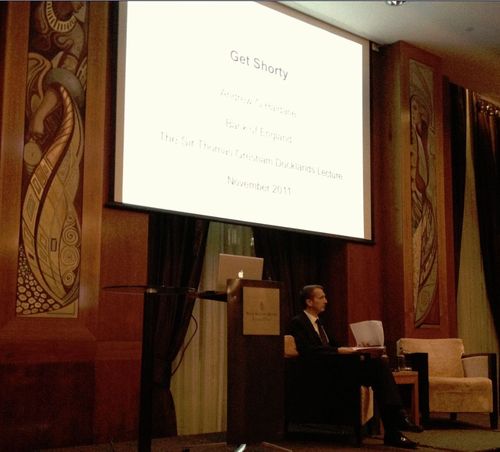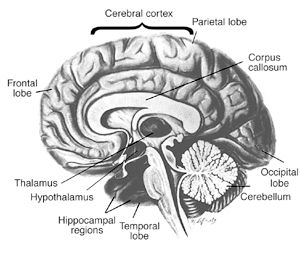
Last night was the occasion of the Sir John Gresham annual lecture.
This year it was held at the Four Seasons Hotel in Canary Wharf with the keynote speaker being Andrew Haldane, or Andy as is the preference, Executive Director for Financial Stability with the Bank of England.

Andy is speaking at the Financial Services Club in 2012, so I was particularly interested in his speech, as well as the fact that I’ve heard and read much about him in the past.
Andy’s theme for the night was short versus long-term investing, and whether short-termism is a good or bad thing.
This theme was based upon Gresham’s Law – bearing in mind this is the Sir John Gresham lecture – that bad money will drive out good. In today’s parlance, short money will drive out long.
But this is nothing new, Andy argued, as short-termism has been with us since time immemorial.
Just look at a few notable quotes from history:
“The untutored savage, like the child, is wholly occupied with the pleasures and troubles of the moment; the morrow is dimly felt; the limit of his horizon is but a few days off”, Jevons (1871)
“Like children who pick the plums out of their pudding to eat them at once”, Marshall (1890)
“It implies only that our telescopic faculty is defective, and that we, therefore, see future pleasures, as it were, on a diminished scale.” Pigou (1920)
It’s all about impatience versus patience and our inability to defer today’s pleasures until tomorrow.
That’s the nature of why we are short rather than long term.
But patience is a uniquely human characteristic.
No animal demonstrates patience like humanity, as it is part of how our brain is built with the pre-frontal cortex providing patience whilst the limbic mid-brain around the cerebral cortex dominates with impatience.

So what is this all about?
Well, from a million or so B.C. to around 50,000 B.C., very little happened.
The GDP of the planet stayed consistently low.
Then something changed.
In 50,000 B.C., Neanderthal man died out and homo sapiens took over.
What changed?
The Brain.
Neanderthals had a short frontal lobe, which is why their forehead is angled, whilst their skull was larger at the rear to accommodate the cerebral cortex.
This is similar to most animals, who are impatient therefore and seek instant gratification to instant needs.
Homo sapiens emerged, and their foreheads elongated as the frontal cortex increased in size.

Hence, patience is a virtue that homo sapiens discovered and is the reason why productivity increased so rapidly from 50,000 B.C. onwards.
The brain is still developing dynamically, and technology today is changing how our brain works.
For example, there was recently a study released that proves that internet search engines are changing the way our brains remember information, as readily available information online makes people easily forget facts since computers become their external memory.
Our attention span is shortening as a result, with jobs, relationships and attention all collapsing into shorter time cycles.
Football managers used to get four or more seasons to prove themselves; now they’re lucky if they last more than one.
Alex Ferguson may well have lost his job 25 years ago, if today’s climate of rapid churn had applied back then.
CEOs used to have a tenure of ten years or more; today, the average is under five.
And marriage is an institution that is lucky to survive till death doth you part.
This applies equally to shareholdings, where the average holding of shares today is months compared to decades forty years ago.
The result is the short money will drive out long, and this self-destructive behaviour is easily seen in evidence today.
For example, in a recent survey, 78% of CFOs said that they would rather sacrifice economic value for smooth quarterly earnings.
That means they would rather avoid investing in their firm’s future if it meant this quarter’s earnings would be consistent.
We see this in dividends.
Forty years ago, dividends were not always issued.
If the company was struggling or needed to invest, they would withhold dividends.
Not now.
Dividends are issued every quarter, regardless of how the firm is coping.
Maybe this reflects the pressures on stock prices and management who often have a stake in their firm’s performance due to share options.
Or maybe it’s just the pressure of the short-termists and the capital markets.
But myopic investing is not necessarily good for growth.
For example, using net present value discounting in a myopic view means that you can see negative returns on projects that would actually be delivering profits in a rational view.
As little as a 0.1 change in NPV can make the difference.
Equally, it shows itself in how firms operate their Research & Development (R&D) budgets.
A survey of the Top 1000 UK corporations found that only 1.39% of revenues were invested in R&D in listed companies compared to an average 2.63% for unlisted companies; similarly only 1.44% of revenues were placed into R&D for UK owned companies compared to 2.7% for UK based companies owned by overseas corporations.
Short-termism is rife in our businesses and it constrains long-term growth and value.
A similar survey was performed across 100,000 US companies by Asker and company found that private firms are over twice as likely to invest in the long-term value of their firms when compared with public companies, and over three times as likely to consider such investments.
So Andy’s presentation kind of summarised the nature of short term capitalism, or quarterly capitalism as McKinsey call it, and he concluded with a few ideas as to how to rectify such short-termism.
These included bringing in some longer term performance metrics for corporations and investors based upon their rate of portfolio churn, R&D spend, etc; linking shareholder rights to the length of a shareholder’s share holding; linking capital gains tax to length of the holding, such that you pay lower taxes for longer holdings; and more.
All good ideas and a view that, at the end of the day, we need to stop the short-termists “picking the plums from the pudding” or allowing the “untutored savage” to ravage the markets.
Andy was then asked a few questions form the floor.
I was amused to hear him talk about lessons from the crisis and that we thought we needed “more regulation and this time it will be better, and more regulators but this time they will be smarter. That kind of didn’t work. We must look instead at the fundamentals of the financial markets structure and address core issues such as the fact that there are some very big banks and many small banks but a missing middle. There aren’t enough mid-size banks out there.”
He did say that regulators are getting some things right now: they recognise the importance and implications of systemically important financial insitutions (SIFIs) and the capital requirements for large banks that go with this. On the downside however, regulators are still grappling with births and deaths - making it easier to get new banks born and unworkable banks removed.
He also has a dramatic turn of phrase.
Take this one for example: “almost all dinner party conversations I go to about the post financial crisis, I go in depressed and leave suicidal.”
But, on regulations and monetary policy, he concluded that “the game is to slow down the deleveraging of the global markets and that is what we have done through zero percent interest rates and quantitative easing.”
On that note, I think he’s pretty much spot on and look forward to meeting and hosting Andy at the Financial Services Club next year.
For a more expansive version of this speech, a similar presentation was given by Andy in May 2011, to the 29th Société Universitaire Européene de Recherches Financières Colloquium: New Paradigms in Money and Finance? in Brussels.
Chris M Skinner
Chris Skinner is best known as an independent commentator on the financial markets through his blog, TheFinanser.com, as author of the bestselling book Digital Bank, and Chair of the European networking forum the Financial Services Club. He has been voted one of the most influential people in banking by The Financial Brand (as well as one of the best blogs), a FinTech Titan (Next Bank), one of the Fintech Leaders you need to follow (City AM, Deluxe and Jax Finance), as well as one of the Top 40 most influential people in financial technology by the Wall Street Journal's Financial News. To learn more click here...

